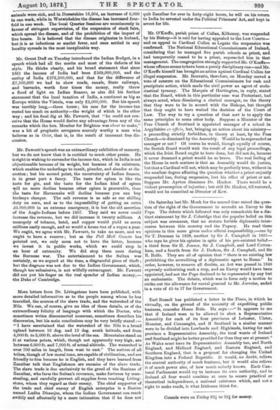On Saturday last Mr. Monk for the second time raised
the ques- tion of the right of the Government to accredit an Envoy to the Pope. The debate which followed was only remarkable for a dis- tinct statement by Sir J. Coleridge that the popular belief on this subject was erroneous, that no statute forbids diplomatic inter- course between this country and the Papacy. He read three opinions in this sense given under official responsibility ,—one by Sir T. Denman in 1828, another by Sir J. Cathpbell in 1833— who says he gives his opinion in spite of his pre-existent belief — a third from Sir H. Jenner, Sir J. Campbell, and Lord Cotten- ham, and a fourth from Sir J. Dodson, Sir J. Campbell, and Sir R. Rolfe. They are all of opinion that " there is no existing law prohibiting the accrediting of a diplomatic agent to Rome." In order, however, to remove all doubts, an Act was passed in 1848 expressly authorizing such a step, and an Envoy would have been appointed, had not the Pope declined to be represented by any but an ecclesiastic. The debate, which was in form only a motion to strike out the allowance for rental granted to Mr. Jervoise, ended in a vote of 45 to 17 for Government.
































 Previous page
Previous page